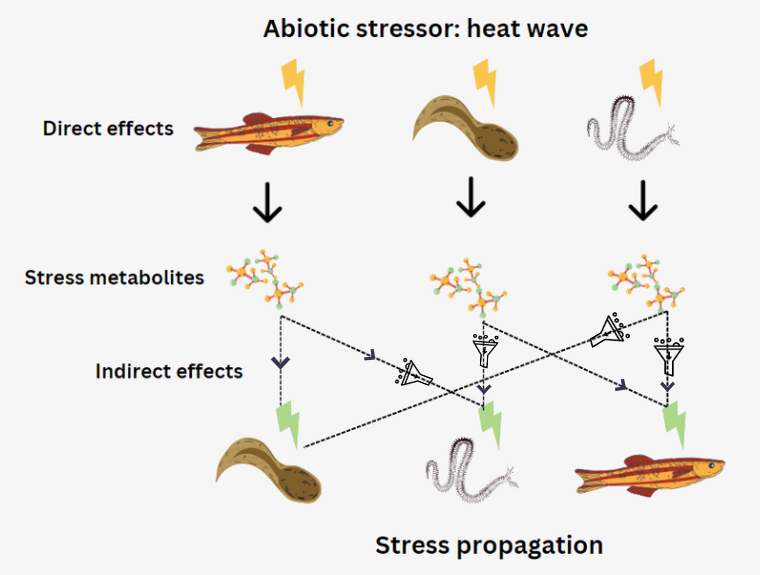Sofia vamos
"The important thing is not to stop questioning. Curiosity has its own reason for existing." - Albert Einstein
Project outline
I am a PhD student at UCD with Dr. Katharina Wollenberg Valero and in my project I delve into the intricate relationship between thermal stress and aquatic ectotherms.
As we are faced with the issues brought by climate change, it is paramount to comprehend how organisms respond to environmental stressors.
It is known that while moderate temperature fluctuations during development can be beneficial, extreme temperature anomalies, often linked to global warming, can have adverse effects. Early life stages, such as embryos and larvae, are especially vulnerable. For instance, thermal stress has been implicated in population declines among amphibians, exacerbating their vulnerability to diseases.
By building upon existing knowledge in the field, my Ph.D. project revolves around exploring the ripple effect of thermal stress through stress metabolites. It aims to validate the existence of a ripple effect induced by thermal stress. This phenomenon involves stress metabolites produced as a response to heightened temperatures, which then propagate through early developmental stages of diverse aquatic ectotherms. This is significant as it adds a new layer to our understanding of the impacts of thermal stress. Investigating how thermal stress-induced signals cascade across species and environments contributes to understanding the mechanisms that can intensify and expedite negative effects, particularly in the context of global warming.
An intriguing aspect of my research pertains to whether these stress responses can be communicated via chemical signals. While social cues prompted by predators or injuries have been extensively studied, our understanding of chemical communication linked to thermal stress is limited. My project empirically investigates whether metabolites released during thermal stress can influence the behavior and development of other organisms, suggesting not only stress communication but also propagation. To test this I am using 3 model organisms: Danio rerio (zebrafish), Hediste diversicolor (marine ragworm), and Heterixalus alboguttatus (madagascan reed frog).
Project outline
I am a PhD student at UCD with Dr. Katharina Wollenberg Valero and in my project I delve into the intricate relationship between thermal stress and aquatic ectotherms.
As we are faced with the issues brought by climate change, it is paramount to comprehend how organisms respond to environmental stressors.
It is known that while moderate temperature fluctuations during development can be beneficial, extreme temperature anomalies, often linked to global warming, can have adverse effects. Early life stages, such as embryos and larvae, are especially vulnerable. For instance, thermal stress has been implicated in population declines among amphibians, exacerbating their vulnerability to diseases.
By building upon existing knowledge in the field, my Ph.D. project revolves around exploring the ripple effect of thermal stress through stress metabolites. It aims to validate the existence of a ripple effect induced by thermal stress. This phenomenon involves stress metabolites produced as a response to heightened temperatures, which then propagate through early developmental stages of diverse aquatic ectotherms. This is significant as it adds a new layer to our understanding of the impacts of thermal stress. Investigating how thermal stress-induced signals cascade across species and environments contributes to understanding the mechanisms that can intensify and expedite negative effects, particularly in the context of global warming.
An intriguing aspect of my research pertains to whether these stress responses can be communicated via chemical signals. While social cues prompted by predators or injuries have been extensively studied, our understanding of chemical communication linked to thermal stress is limited. My project empirically investigates whether metabolites released during thermal stress can influence the behavior and development of other organisms, suggesting not only stress communication but also propagation. To test this I am using 3 model organisms: Danio rerio (zebrafish), Hediste diversicolor (marine ragworm), and Heterixalus alboguttatus (madagascan reed frog).
My hypotheses stem from the premise that if the ripple effect is universal, thermal fluctuations will prompt the production of metabolites that induce quantifiable changes in both related and unrelated species. By analyzing developmental and behavioral traits, I seek to differentiate between stress communication and stress propagation which may in turn have implications for our comprehension of species' adaptability to evolving climates and the intricate interactions that shape ecosystems.
Bio/who am I:
A little bit about myself and my trajectory! I was born and raised in Rio de Janeiro, Brazil, where the jungle meets the sea. Since I was very young, I have been fascinated by the Natural world and sought to understand why and how things are the way they are and work the way they work. In particular, my biggest interests for the past 10 years have been on how climate change affects the thermal physiology and behavior of ectothermic animals.
I completed my undergraduate degree in Ecology and Evolutionary Biology at University of California, Santa Cruz. There, I had incredible experiences and opportunities to work in the field with cool things like restoration ecology, small mammal research, elephant seal diving physiology field research, tropical community ecology, and to work in Dr. Barry Sinervo’s lab with behavioral ecology and thermal physiology of different salamander species.
After graduating, I spent the summer of 2019 working with coral restoration in Madagascar, and then started my Masters degree in Ecology at the University of Zurich, in Switzerland. My MSc. project was unrelated to what I had previously worked with, which gave me the opportunity to further expand my knowledge, this time into the magical world of plants. I worked on the local adaptation and heavy metal resistance of the macrophyte Lemna minor across different regions of Switzerland. After the pandemic, I took a sabbatical from Academia to recover and work in unrelated areas for experience.
When I found the listing for this current PhD position at UCD, I just knew I had to apply. Fast-forward a few months and I find myself living in beautiful Dublin and working on an incredible project alongside an amazing team of scientists.
During my free time, I love to scuba dive, ski, swim, run (any sport, really), travel, cook, read, and have great conversations.
I am keen on helping undergrads be excited about science and become critically thinking scientists. From personal experience, I know the effect that hands-on participation in research can have on someone and give them opportunities to build their scientific identities. So, feel free to email me at sofia.duartevamos @ ucdconnect.ie if you have questions or ideas and want to chat about them.
Publications:
Sofia Vámos, Cheng Li, Aboubakr Moradi, Sofia Julia van Moorsel. 2023. High tolerance to zinc but no evidence for local adaptation in the aquatic plant Lemna minor. Nordic Journal of Botany. 2023:e04078. https://doi.org/10.1111/njb.04078


